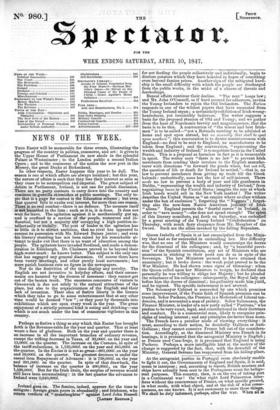Ireland goes on. The famine, indeed, appears for the time
to mitigate : foreign grain pours in abundantly ; and Irishmen, who return verdicts of " manslaughter " against Lord John Russell [LATEST EDITION.] for not feeding the people collectively and individually, begin to disclose potatoes which they have hoarded in hopes of something even beyond famine prices. Another sign of the mitigated hard- ship is the small difficulty with which the people are discharged from the public works, in the midst of a chorus of threats and forebodings.
Repeal affairs continue their decline. "The rent" keeps low; and Mr. John O'Connell, as if hard pressed for adherents, invites the Young Irelanders to rejoin the Old Irelaxiders. The Nation. responds in one of the wildest papers that have emanated from the Young Ireland organ ; a melancholy exhibition of Irish wrong- headedness, yet irresistibly ludicrous. The writer suggests a basis for the proposed reunion of Old and Young,; and we gather from the haze of Napoleonic brevity and magniloquence, that the basis is to be this. A convocation of "the wisest and best Irish- men" is to be called—" not a Rotunda meeting to be adulated at home and spat upon abroad, but an assembly that shall be spat upon nowhere"; this convocation is to decree nonintercourse with England—no food to be sent to England, no manufactures to be taken from England ; and the convocation, "representing the wealth and industry of Ireland," is to negotiate loans in the United States. This is a proposal as harmless in fact as it is treasonable in spirit. The writer says "there is no law" to prevent Irish merchants from sending their invoices to the English manufac- turer with directions "to forward the goods when, but not till, the question of life or death for Ireland be settled,"—that is, no law to prevent merchants from giving up trade till the Greek kalends : undoubtedly, none but the law of self-interest. There needs no law to prevent a body of poor and idle gentlemen in Dublin "representing the wealth and industry of Ireland," from negotiating loans in the United States: imagine the rate at which Irish bonds would sell in the New York. market! The writer describes the United States as "an empire where no class wildiaza under the ban of exclusion "; forgetting the " Nimrs ; forge-. ting also the new-born Native American jealousy of Irish "aliens." England permits the "fearful curses "in Ireland,. in order to "save money"—she does not spend enough! The sprit of this literary manifesto, put forth on Saturday, was embodied. by a great meeting of the Young Ireland "Confederation" on Thursday, with much fiery eloquence from Mr. Meagher of the Sword. Such are the allies invoked by the falling Repealers.


























